
Jul 8, 2019 | Money Professor

Let me start by saying the cheesiest thing- the choice comes down to what do you need and what can you afford?
My husband and I get asked a lot if we have bought a house and the answer- which also applies to many frequented questions is NO. Although we have been married five years and we have been officially out of school for a while, we have not yet bought a home. Several factors influence our decision-making process. Hopefully, this post will help you if you are debating similar issues.
One of the things people say a lot is that renting is wasting money. It is not – you get a place to live in. You can waste money in either situation; if you rent or buy a home that is way beyond your means or bigger than you need (McMansion ALERT). Having a place to stay that is within your budget and financial goals is not wasting money-it is a blessing.
Some questions to ponder before you make a decision
- How much can I afford to pay for my living situation? If you can only afford to spend $500 a month for the roof over your head, then you may not be ready to purchase a home.
- Do I have consumer and or student debt? If you have a lot of debt, you may not want to buy a house and add a mortgage to your debt bill –
- Do I have a solid emergency fund? The experts suggest 4-6 month’s worth of living expenses saved in an easy to access high yield savings account before making major investments. Fellow millennials and baby cousins in Generation Z- please trust me when I say emergencies happen. You need an emergency FUND.
- If I were to buy a home, could I afford a decent down payment to avoid paying PMI and other protections? You can probably take advantage of many first-time buyer deals and put just 5% down, but some financial experts say it is always better to have at least 10-20% down payment saved. If you don’t use it all for the downpayment you may need it for closing costs and moving expenses.
- Do I have money set aside for home ownership related expenses that can occur as soon as I move in? These can include flooding basement, failing AC or heating system, leaking roof, etc. Things happen. Unless you are getting a brand new home chances are that it will have some issues.
- Could I comfortably pay my mortgage if I lost my job? This is important.
- Do I plan to live in this home for at least five years? If you are still moving jobs buying a home may be risky – if you are unable to find a renter, you may find yourself paying a mortgage for an empty house. If you find a terrible renter, you may still pay your mortgage plus rent at your new place.
- The cost of buying a home is more than the cost of a mortgage and down payment. You will need to pay taxes, homeowners insurance, fix things, mow your lawn, keep up with neighbors and their gardens – heating a home is also kinda expensive.
- Owning a home is also fantastic – you can paint the house fun colors, and you do not need permission to drill the walls.
- A home purchase can be a worthwhile long-term investment, especially if it is in an area where home values appreciate.
At the end of the day, do not feel pressured to rent or own a house. Your bank account will tell you what you can afford. The heart might lead you astray.
P.S. I am not a certified financial advisor this is just my fun blog

Jun 22, 2019 | Money Professor
You Should Check Your Balances $ Regularly
How often do you check your account balances (credit card, checking, and savings)? For most people, the truth is never because checking the balance can be anxiety wrecking. One of my friends told me that she gets the same sinking feeling in her tummy when she logs into her account as when she goes to the dentist. It can be scary, but like going to a dentist checking our account balances is important.

It can feel like so
How often should you check your balances? Ideally, at least twice a week but as with everything take baby steps until you feel comfortable and maybe you will check your accounts daily. You should also floss daily, but you know…

Advantages of checking your account balances on the regular
- Confirm that all transactions are correct. It is possible to get overcharged because service providers are human and make mistakes too.
- Catch ERRORS!- AT&T is notorious for small charges like $13.99 that can go one for years. Look over your accounts and make sure you are not paying for a service you are not getting. The good news is that if you report the charge, you may even get a refund
- Avoid overdrafts or spending more than you can pay off on your credit card. Most people probably go over their budget because they innocently assume that they have enough funds. Overdrafts are costly, so avoid them.

- Catch FRAUD– You want to know if Joe Stealmoney in Georgia charged $300 for new the Michael Kors bag on your account. If you don’t know the story go to twitter and search #michaelkors
- Stay on top of your balance– Know how much money you have in your account. Know how much you have spent on your credit card
Log on to your BANK or Mobile Balance NOW-
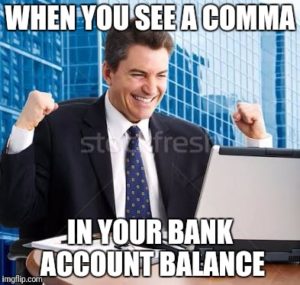
This is the goal
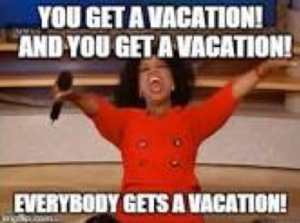
Jun 20, 2019 | Money Professor
It’s SUMMERTIME SO!!!!

Nothing sucks like coming back home to an empty bank account – because YOLO- when in fact you have bills to pay.
A newish survey from Bankrate found that about 60% of people living in the US will not be able to take a vacation because funds are tight. Holidays are not a need, but it is fun to let loose and travel. On social media, I have had enjoyed following conversations on vacations but not listening to my friends pinning for trips they feel they can’t take. Can we agree that many of us would love to travel? It doesn’t matter if you are going a couple of hours from home or a few thousand miles – you will have more fun if you budget for your trip.
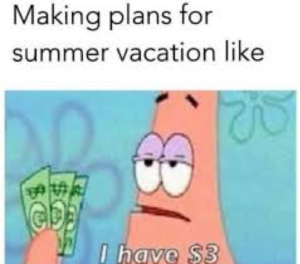
Vacation is expensive. Are you planning a trip? Think about how much you think you will spend – now double or triple that number. I am a planner, and I was shocked by how much we spent on our recent trip to Paris. I am glad I had budgeted, but we certainly underestimated the small costs associated with international travel.
STEPS TOWARDS A $$ STRESS-FREE VACATION
- Three to Six months out– Set a realistic savings goal
- Get realistic about the cost of flights to your destination. Use google flights and cross check that number with a few airlines. You can fly to Capetown for just under $1,500 if you book today – Just saying JWrite down the number $$$
- Get a realistic cost for housing – I suggest Airbnb or some other house share for a trip longer than three days & hotels for a shorter trip. Airbnb is probably better if you are going as a group. Write down the number $$$
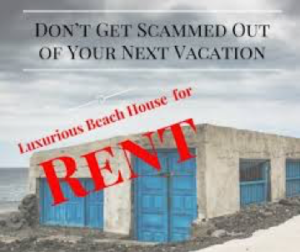
Some airbnb’s and hotels can be trash too so do your research
- Get a realistic cost of local transportation – if you plan on renting a car then use your favorite car rental website to compare deals
STOP HERE – If there is no way you can manage steps 1.1 to 1.3 without dipping into your credit card and incurring debt, then you are not ready for this trip. Instead of going to Capetown consider something close to home
- Set a realistic goal for dining: When we went to Paris, I completely underestimated how expensive Europe is. Use yelp to get a sense of what people are spending per night – how much you pay depends on your taste and how much work you do. This confession will not make me look good, but in the spirit of transparency (truth is overrated), we once spent $150 for a simple dinner at a Jamaican restaurant in New York City because we had no idea where to go for reasonably priced -or regular black person- Jamaican meal in NYC. Strangely enough, I never spend a lot on meals in London because the drinks are cheap, hahaha. In Harare, Capetown, Nairobi, Lagos, etc. you can eat for cheap or spend a lot – the point is to get a sense of the average cost of meals, multiply that by 3 to get a daily rate and by the total number of days to get an estimated bill.
You will likely spend between $50 and $100 per person per day in most places around the world.
- Set a realistic goal for local transportation – in Europe use public transit. For five days, you are looking at about $60/week. Most major African cities have uber, but the rates are quite high so that local taxes might be a good option. Seek local advice and stay safe.
- Set a realistic budget for all your sight-seeing adventures: I assume you are going on vacation to have some fun
- Pre-purchase any tickets for museums or anything that has an entry fee. Do not use third-party websites if you can avoid them- pre-purchasing will not only keep you within budget, but you avoid exchange rate dilemmas
- Research the other things you won’t get to up to- swimming with dolphins will cost between $50 and USD 100 in Zanzibar, entering the Vic Falls is between $2 and $45 depending on your citizenship (You do not want to die without ever having visited the Falls)…

You can watch the video of him bungee jumping – it was awesome. I have also done a few crazy things in Vics like walking with lions – I know – why are you judging me
- Remember, most things are free- visiting the Eiffel Tower is free you only pay if you want to go to the top (est. $30).

I took this loopy looking pic
- Start saving for the trip
- Divide the totals from step 1 by the total number of paychecks before your trip. That is how much you should be setting aside each month.
- Set up direct deposit into your savings account for your trip – DO THIS
- Pay for most expenses before you leave home
- Purchase your ticket on your credit card and pay it off
- Book your hotel (set aside the money and be ready to pay it off when you check in.)
- Buy your museums passes etc. and pay off the balance
- Get travel insurance: protect all your purchases because things happen
- Set aside an emergency or over budget fund – about 20% of your expenses (excluding fixed things like flight and hotel)
- STICK TO YOUR BUDGET AND HAVE FUN
Jun 17, 2019 | Money Professor
What is your money story?
Understanding your money story is the key to unlocking a new, balanced and healthy relationship with
money
Everyone has a money story.
Whether you say:
I grew up poor- we never had money
I grew up wealthy; my parents never talked about money
I have no idea how my parents made money
Our money stories shape the way we think about and spend money. In a perfect world, we all grew up with parents or guardians that opened up to us about finances, budgeting, saving, and overcoming particular hurdles. But, many of us did not. I think this is something that transcends culture, although there is always some degree of variation.
It is important to be able to tell yourself your money story. You can write it down or email me if you want.
Now that I am an adult, I think most parents and guardians did the best that they could do given their upbringing. While it is essential to acknowledge that some of our money stories are have caused some problems for us in how we deal with money, try not to judge yourself and your family too much. Acknowledge the stories, identify areas of healing or improvement, and begin small steps towards healthy money habits.
My parents heavily influenced my money story. My mom and stepdad were very open about money. Not the nitty gritty but they did share some necessary details about their decision making as far as it concerned me. I will share some stories that I hope will help you as you flesh out your money story.
- Living below our means
At some point in my life, I was stressing to mom that I wanted to go to a more expensive school. My school was not bad as far as academics went, but I was having my issues about what I thought was good enough. Anyway, my parents sat me down and explained that my tuition at my current school was manageable for them because they could pay for my entire annual tuition once without straining. Additionally, a reasonably priced education gave them room to provide me other extras like school trips, novels, toys, etc.
My parents explained that taking me to a fancier school – in my case, this lovely school called Peter House- would force them to cut down on other expenditures and they would always be anxious about managing the fees should their financial situation face a slight change. My dad was retired, and my mom ran her own business. Owning a business is incredible but in places like Zimbabwe, business owners deal with severe fluctuations in profits.
- Planning ahead for the big items
For my parents, it was always important to be able to pay in advance for big-ticket items. If I wanted to go on a school trip, I had to tell my parents way in advance, or I was not going. Their worrying created a bit of anxiety, and subsequently, I am a little bit obsessive about planning. My mom especially hated surprises.
- Being open to all kinds of work opportunities
My mom always emphasized that I am not above doing any job. My mom believes that when it comes to working, you do your best so that you can go home and live in relative comfort. My mom balanced running her business and being a trader in South Africa. As a trader, she was gone for months at a time and lived in less than ideal housing circumstances in SA, but it meant afterward she returned to her extremely beautiful and super comfortable home.
As a result, I am very comfortable doing any job. I have no issues, BUT that also means that sometimes I get stuck wasting time on random hustles when I should be out there strengthening my portfolio for the career I want.
Whatever your story is- write it down or think it out loud. Do you see some patterns that you need to change? What have you learned from your story?

Jun 10, 2019 | Money Professor
License to Splurge

I don’t know about you, but sometimes I need a couple of my girlfriends, plus my husband and maybe mom to give me the go-ahead to spend on myself. There is all this advice that we should stop drinking coffee or eating avocados because those tiny expenditures will add up to a million bucks and before you know it you just missed out on being a millionaire. Crazy, I know!
What is the point of life and working hard if we can’t give ourselves little pleasures? I also learned that if we do not spend on ourselves, we become bitter. There was a time when it felt like every other phone call that I got from home was about bad news death, illness, broken down vehicles, etc. – and all of these things required money. A lot of the way I think about money is informed by my own experience living away from home at a very young age and doing so at a time when the Zimbabwean economy was in free fall. A friend of mine came up with a suggestion- she said for every western union trip we made we should buy ourselves something nice, ice cream or a dress.
So how do we splurge responsibly? Ladies and gents, I know you want to get your hair done, nails, get those nice running shoes, yoga pants, nice phone, bigger TV the list is endless. We all have things that we want. Here are a few ways that you can work towards splurging responsibly in a way that is in line with your goals and doing so without breaking the bank or diving into the emergency fund. I know that sometimes getting your hair done feels like an emergency, but it is not an emergency fund worth crisis, so don’t even think about it.
1. Make a list of your wants
2. Get a sense of how much you spend on your desires per month. I would suggest printing out your bank and or credit card statements from the last year and highlighting all the wants. If you use online banking, you can request these nice-looking graphs for your expenses. I did this exercise at the beginning of the year, and the results shocked me. I had not realized just how much I was spending on traveling.
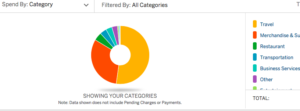
You can break down to the merchant, which is nice. Doing this small exercise forced me to be very honest with myself about what kind of things I spend my money on and how I can make adjustments to those expenditures.
3. Set up a small budget for your splurge! Yes, budget it in. If you know that you spend $20/week on coffee, then add $20 to your weekly food budget. Consider how your numbers change when you add in all these small things. If you suddenly find yourself over budget, then look through your budget and find places to make cuts. For example, if you are paying $26 for a gym membership that you have only used once but you ride your bike more then maybe consider canceling the membership and adding to your bike maintenance budget.
4. Save over time for bigger or costlier splurges like a vacation. Vacations are fantastic, but you do not need a vacation every month. I will write in a separate post on how to budget for holidays more productively.
5. Enjoy life a little 🙂














Discussion